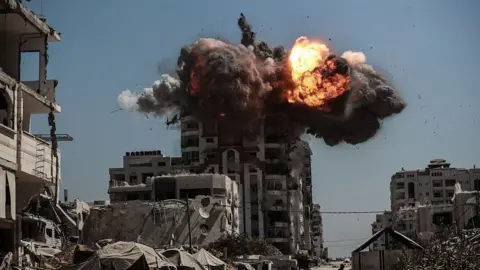 Anadolu via Getty Images
Anadolu via Getty ImagesIsrael has launched its long-planned major ground offensive on Gaza City, conducting heavy air strikes overnight as troops pushed into the edges of the city.
Thousands of Palestinians have been forced to flee down a single coastal road to the centre of the Strip, joining hundreds of thousands who have already fled.
Israeli Prime Minister Benjamin Netanyahu said a “powerful operation” had been launched against Hamas’s “last major stronghold” amid sharp criticism from the UK and other countries.
The offensive comes as a UN commission of inquiry found that Israel was committing genocide in Gaza.
Huge columns of Palestinians were seen streaming towards the south in donkey carts, rickshaws, vehicles strapped high with belongings, and on foot.
Large parts of Gaza City were already destroyed in the first stages of the war in 2023, though around a million Palestinians had returned to their homes since then – often among rubble and bombed-out buildings.
The Israel Defense Forces (IDF) estimates 350,000 people have now fled, though more than half a million remain in the city. All are being asked to flee south to a “humanitarian zone” in a central, coastal part of the Strip.
Many Palestinians say they cannot afford to go south, while others say southern and central Gaza are not safe as Israel has carried out air strikes there too. Some have said they attempted to go south but found no space to pitch their tents, so returned to Gaza City.
Lina al-Maghrebi, 32, a mother of three from the city’s Sheikh Radwan neighbourhood, told the BBC: “I was forced to sell my jewellery to cover the cost of displacement and a tent.”
“It took us ten hours to reach Khan Younis, and we paid 3,500 shekels [£735] for the ride. The line of cars and trucks seemed endless.”
Amjad al-Nawati, 33, told the BBC the “ear-splitting” noise of bombing through the night had scared his disabled brother, Ahmed.
“He kept putting his hand on his ears… and trembling from fear. I had to calm him and tell him we are leaving soon. It was one of the worst nights in his life.”
Gaza’s Hamas-run health ministry says 59 people were killed and at least 386 injured in the past 24 hours. Three people, it adds, died as a result of famine and malnutrition, including one child.
“Gaza is burning,” Israel’s Defence Minister, Israel Katz, wrote on X, as the offensive began. “The IDF strikes with an iron fist at the terrorist infrastructure and IDF soldiers are fighting bravely to create the conditions for the release of the hostages and the defeat of Hamas.”
An IDF official said it believed up to 3,000 Hamas combatants remained in the city.
The operation has drawn widespread international condemnation, with UN human rights chief Volker Türk describing it as “totally and utterly unacceptable”.
In other reaction:
- UK Foreign Secretary Yvette Cooper called the offensive “utterly reckless and appalling”, saying it would “only bring more bloodshed, kill more innocent civilians and endanger the remaining hostages”
- Turkey’s foreign ministry said the assault was a new phase in Israel’s “genocide plans” and warned that it would trigger mass displacement
- German Foreign Minister Johann Wadephul said it was “the completely wrong path” and called for diplomacy.
But US Secretary of State Marco Rubio appeared to offer tacit support for Israel’s operation during a joint press conference with Netanyahu on Monday, saying the US preferred a negotiated end to the war, but that “sometimes when you’re dealing with a group of savages like Hamas, that’s not possible”.
The UN commission of inquiry said its latest report was “the strongest and most authoritative UN finding to date” on the war. However, it does not officially speak for the UN.
Among its findings are that Israeli security forces perpetrated “sexual and gender-based violence”, directly targeted children with the intention to kill them, and carried out a “systemic and widespread attack” on religious, cultural and education sites in Gaza.
Navi Pillay, the chair of the panel that produced the report, said: “The genocide convention was born out of humanity’s darkest chapters.”
“Today, we witness in real time how the promise of never again is broken and tested in the eyes of the world,” she added.
Israel’s foreign ministry said it categorically rejected the report, denouncing it as “distorted and false”.
Israel launched its war in Gaza in response to the Hamas-led attack on southern Israel on 7 October 2023, in which about 1,200 people were killed and 251 others were taken hostage.
At least 64,964 people have been killed by Israel during its campaign since then – almost half of them women and children, according to Gaza’s health ministry.
With famine having already been declared in the area by a UN-backed body, the UN has warmed an intensification of the offensive will push civilians into “even deeper catastrophe”.
